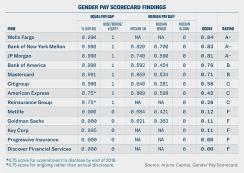Goldman Sachs, MetLife, Key Corp., Progressive Insurance, and Discover Financial Services are among the worst performers on Proxy Impact and Arjuna Capital’s Gender Pay Scorecard, which came out Tuesday.
Each of those financial firms received an “F” grade from Arjuna — an environmental, social, and governance-focused private equity firm — which partnered with the proxy voting service on the scorecard. Five categories dictated the scores, including adjusted equal pay gap, median pay gap, racial pay gap, commitment to making changes and the percent of employees’ salaries included in the data reported.
Gender inequity has long been an issue on Wall Street. While many banks have moved on from the “Boom-Boom Room” era during which women working at big banks were often vocally harassed, the wage gap continues to pose problems in the industry, according to the report.
Arjuna and Proxy Impact produced their first ever scorecard using data provided through U.K. gender pay reporting requirements and data voluntarily released by the companies included. Those included were companies in the financial, consumer, and technology sectors that had investors — either Arjuna or other firms — who had engaged them on the gender pay issue previously.
[II Deep Dive: Blackstone Reports 30% Gender Pay Gap in U.K.]
Within the financial sector, Arjuna and Proxy Impact graded 13 companies. Those with “A-” grades include JPMorgan, Bank of New York Mellon, and Wells Fargo. Bank of America and Mastercard received “B” grades, while Citigroup, American Express, and Reinsurance Group got “C” grades.
“I think we’ve seen a lot of success and momentum this year in the finance industry in terms of companies making commitments to closing the wage gap,” Arjuna managing partner Natasha Lamb said by phone. “That started with Citibank coming out with their gender pay gap data and giving women and minorities at the firm raises.”
In January, CitiGroup responded to a shareholder proposal from Arjuna by raising the pay for minorities and women in the United States, the United Kingdom, and Germany.
Others, according to Lamb, are following suit. Many are now required to disclose wage gaps as a result of new United Kingdom reporting requirements.
“I think one of the things that we’ve seen is a bit of a chaotic landscape,” Lamb said. “Companies are rushing to catch up. This report lays out clearly what’s expected and what best practices are.”
Some companies appear to be holding fast to the status quo even as they receive poor scores from Arjuna.
When contacted for comment, a MetLife spokesperson highlighted the group’s commitment to diversity. “MetLife is proud to have a diverse and inclusive culture, and pay equity is integral to the way we do business,” a spokesperson for MetLife wrote via email. “We are committed to attracting, retaining, and optimizing the performance of our diverse workforce, to best meet the needs of our customers.”
A spokesperson for Key Corp. shared a similar statement. “Key is the nation’s only large regional bank with a female chief executive officer, has several prominent female executives on its executive leadership team, and has strong gender diversity on its board of directors,” according to the statement.
Spokespeople from Goldman Sachs, Progressive Insurance, Discover Financial Services, JPMorgan, Bank of New York Mellon, Wells Fargo, Bank of America, Mastercard, Citigroup, American Express, and Reinsurance Group did not immediately return phone calls seeking comment.








